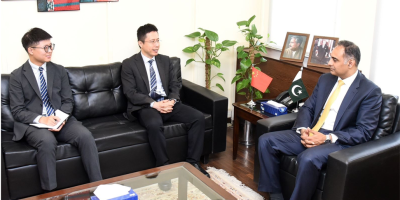Pakistan wants as many Taliban groups as possible to join talks

ISLAMABAD: Pakistan said as many Taliban groups as possible must be persuaded to join any upcoming peace discussions with the Afghan government, as a third round of four-country talks aimed at reviving negotiations with the insurgent group began Saturday.
Delegates from Afghanistan, Pakistan, China and the United States convened in the Pakistani capital Islamabad over the weekend even as the insurgents wage an unprecedented winter campaign of violence across Afghanistan.
Pakistan’s advisor for foreign affairs Sartaj Aziz said a joint effort would help persuade the Taliban to join the process and lead to a “significant “reduction in violence.
“We believe our collective efforts at this stage, including through supportive CBMs (Confidence Building Measures), have to be aimed at persuading the maximum number of Taliban groups to join the peace talks,” Aziz said during his opening statement at the third-round of talks on Saturday.
“In our view, a clear, well-defined and actionable roadmap for the peace process between the Afghan Government and Taliban groups is important.“
Sartaj Aziz,said there should be no preconditions to negotiations yet the Taliban have already said they would not hold direct talks with the Afghan government until they first held talks with US officials.
Previous rounds of the four-country talks have ended with a promise to meet again but Aziz said this time he wants to see the roadmap to peace emerge by the end of today’s meeting.
Kabul too expressed its eagerness for results. “We are desperately waiting to see the immediate effects and results of our quadrilateral meetings and the progress we have made in the two previous meetings,” Javed Faisal, deputy spokesman for Afghanistan’s Chief Executive Abdullah Abdullah, told The Associated Press.
A diplomat attending the peace talks said one of the biggest bumps on the road to peace is identifying those Taliban who aren’t interested in peace or with whom the Afghan government considers “irreconcilable”.
Another challenge is coming up with a set of confidence-building measures that will be good enough to lure Taliban to the table.
The diplomat asked that neither his name nor nationality be used because he was not authorised to talk to the media.
Aziz expressed annoyance during the first round of talks held last month when Faisal issued public statements saying Pakistan was to produce a list of Taliban representatives willing to talk peace.
The list never materialised and Aziz chastened officials participating in the talks about speaking to the media. Aziz said whatever roadmap the four-country meeting agrees upon, it will have to clearly lay out each phase of what is certain to be a multi-phase process.
He said there also has to be a way to gauge progress “We believe our collective efforts at this stage … have to be aimed at the persuading maximum number of Taliban groups to join the peace talks,” said Aziz. “This will contribute to imparting a momentum to the process offering the incentive of political mainstreaming to the insurgent groups, and gradually shrink the space for the irreconcilables.“
The first round of the roadmap talks was held in Islamabad last month, where delegates began laying the groundwork for direct dialogue between Kabul and the Islamist group.
A second round was held in Kabul on January 18 which urged the Taliban groups to enter into early talks with the Afghan government without preconditions.
Taliban representatives have been notably absent during the process and analysts caution that any substantive talks are still a long way off.
The Taliban has stepped up attacks on government and foreign targets in Afghanistan this winter, when fighting usually abates, underscoring a worsening security situation.
Observers say the intensifying insurgency highlights a push by the militants to seize more territory in an attempt to wrangle greater concessions during talks.
Pakistan — the Taliban’s historic backers — hosted a milestone first round of talks directly with the Taliban in July last year.
But the negotiations stalled when the insurgents belatedly confirmed the death of longtime leader Mullah Omar, sparking infighting within the group.
Afghanistan sees the support of Pakistan as vital to bring the Taliban to the negotiating table.
Related News

PPPP delegation visits Iranian embassy, condemns Israeli aggression
ISLAMABAD, Jul 3 (APP/DNA):A senior delegation of the Pakistan Peoples Party Parliamentarians (PPPP) led byRead More

Bilal Azhar Kayani Meets Chinese Embassy Officials to Discuss Bilateral Cooperation
ISLAMABAD, JULY 3 (DNA): Minister of State for Finance, Railways and Head of the PrimeRead More


Comments are Closed